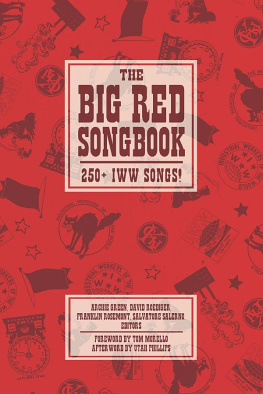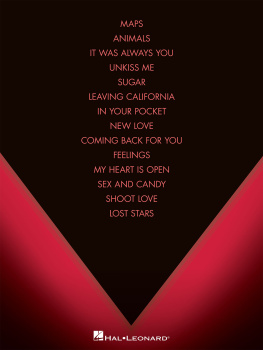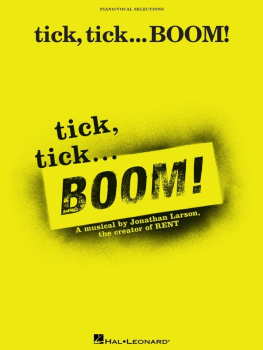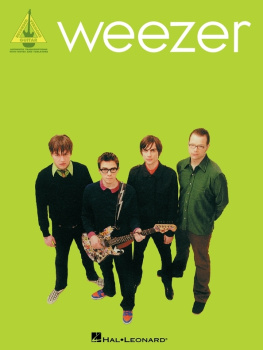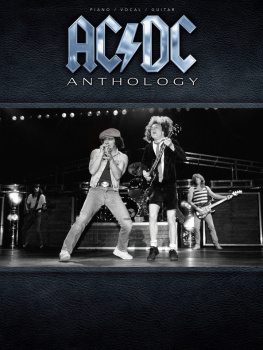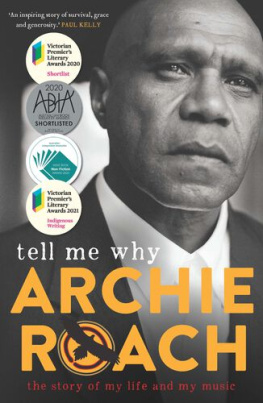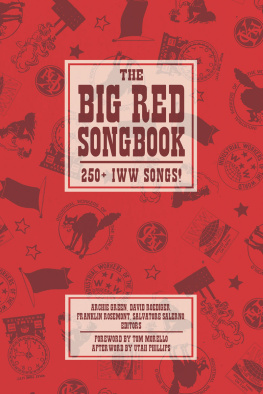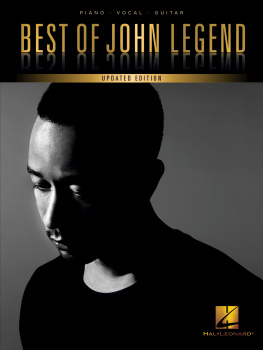Green Archie - Big Red Songbook
Here you can read online Green Archie - Big Red Songbook full text of the book (entire story) in english for free. Download pdf and epub, get meaning, cover and reviews about this ebook. year: 2016, publisher: PM Press, genre: Romance novel. Description of the work, (preface) as well as reviews are available. Best literature library LitArk.com created for fans of good reading and offers a wide selection of genres:
Romance novel
Science fiction
Adventure
Detective
Science
History
Home and family
Prose
Art
Politics
Computer
Non-fiction
Religion
Business
Children
Humor
Choose a favorite category and find really read worthwhile books. Enjoy immersion in the world of imagination, feel the emotions of the characters or learn something new for yourself, make an fascinating discovery.
- Book:Big Red Songbook
- Author:
- Publisher:PM Press
- Genre:
- Year:2016
- Rating:5 / 5
- Favourites:Add to favourites
- Your mark:
- 100
- 1
- 2
- 3
- 4
- 5
Big Red Songbook: summary, description and annotation
We offer to read an annotation, description, summary or preface (depends on what the author of the book "Big Red Songbook" wrote himself). If you haven't found the necessary information about the book — write in the comments, we will try to find it.
Big Red Songbook — read online for free the complete book (whole text) full work
Below is the text of the book, divided by pages. System saving the place of the last page read, allows you to conveniently read the book "Big Red Songbook" online for free, without having to search again every time where you left off. Put a bookmark, and you can go to the page where you finished reading at any time.
Font size:
Interval:
Bookmark:
 Born into a pro-IWW Finnish farm family in Wisconsin, Jenny Lahti Velsek (19132006) joined the union in 1933 and remained a true-blue Wobbly her whole life. A popular accordionist at IWW social events, she was also a longtime member of the Board of the Charles H. Kerr Publishing Company. This book is dedicated to our friend and Fellow Worker JENNY LAHTI VELSEK (19132006) The Big Red Songbook: 250+ IWW Songs! Archie Green, David Roediger, Franklin Rosemont, and Salvatore Salerno PM Press 2016 All rights reserved. No part of this book may be transmitted by any means without permission in writing from the publisher Originally published 2007 by Charles H. Kerr Publishing Company
Born into a pro-IWW Finnish farm family in Wisconsin, Jenny Lahti Velsek (19132006) joined the union in 1933 and remained a true-blue Wobbly her whole life. A popular accordionist at IWW social events, she was also a longtime member of the Board of the Charles H. Kerr Publishing Company. This book is dedicated to our friend and Fellow Worker JENNY LAHTI VELSEK (19132006) The Big Red Songbook: 250+ IWW Songs! Archie Green, David Roediger, Franklin Rosemont, and Salvatore Salerno PM Press 2016 All rights reserved. No part of this book may be transmitted by any means without permission in writing from the publisher Originally published 2007 by Charles H. Kerr Publishing Company
| PM Press | C.H. Kerr Company |
| PO Box 23912 | 1726 Jarvis Avenue |
| Oakland, CA 94623 | Chicago, IL 60626 |
| www.pmpress.org | www.charleshkerr.com |
 A Note on Mini-Cartoons: Starting in the early 1920s, and continuing through the late 1940s, IWW cartoonist William Henkelman did a series of postage-stamp-size cartoons (see example above) in which well-known capitalist ads and trademarks were subversively and satirically revised, in a Wobbly spirit. Several of these mini-cartoons are reproduced in this book, as space allowed.
A Note on Mini-Cartoons: Starting in the early 1920s, and continuing through the late 1940s, IWW cartoonist William Henkelman did a series of postage-stamp-size cartoons (see example above) in which well-known capitalist ads and trademarks were subversively and satirically revised, in a Wobbly spirit. Several of these mini-cartoons are reproduced in this book, as space allowed. Then repeat until we win. The Industrial Workers of the World (or Wobblies as they were widely known) were the shock troops of the early twentieth century labor movement. They practiced revolutionary industrial unionism and their tactics, goals, and credos were truly revolutionary. Unlike other unions of their time they accepted all workers as members: blacks, women, unskilled laborers, sex workers, immigrants of every race and creed. They sought to forge One Big Union of the entire global working class and used direct action, sabotage, and the power of song in their open class war with the ruling class. And while the Wobblies have yet to achieve their ultimate goal of the abolition of the wage system, their reputation as a kickass union fueled by kickass songs remains the stuff of legend.
The IWW literally wrote the book on protest music. These songs, some written many decades ago, address the same issues facing us today: poverty, police brutality, immigrant rights, economic and racial inequality, militarism, threats to civil liberties, union busting. Often set to familiar tunes and popular hymns of the day, these songs united workers from diverse ethnic backgrounds. The music was the message: solidarity. Whats the antidote for divide and conquer? Work together, fight together, sing together. One Thousand Songs, One Big Union.
Ive been a member of Local 47 Musicians Union in Los Angeles for twenty-seven years and Im a proud card-carrying member of the Industrial Workers of the World. My mom was a union high school teacher, and the Morellos were hardworking coal miners in central Illinois. Im a union man and an unapologetic musical rabble-rouser. The cause of workers rights is in my blood. Ive been greatly influenced by many of the songs and songwriters contained in this book, and under my Nightwatchman moniker Ive penned dozens of tunes that owe a significant debt to this union and its remarkable history of song. Much of my career has been one long audition to be included in the next edition of this tome.
The tunesmiths of the IWW laid the sonic and ideological groundwork for those who followed in their footsteps: Woody Guthrie, Pete Seeger, Utah Phillips, Bob Dylan, Phil Ochs, Bruce Springsteen, The Clash, Public Enemy, Billy Bragg, Ani DiFranco, System of a Down, and Rage Against the Machine. Without the songs in this book theres no This Land Is Your Land, no We Shall Overcome, no Masters of War, no London Calling, no Killing in the Name. Defiant and hopeful, The Big Red Songbook is Peoples Poetry. The unapologetic mission statement is emblazoned right there on the front cover: Songs to Fan the Flames of Discontent. The goal was (and is) a simple one: boost morale, promote solidarity, and lift the spirits of the working class. Traveling songs, spreading-the-news songs, stirring-folks-up songspenned by hobos and the homeless, itinerant workers and immigrants these songs combine harmonizing and hell-raising, rhythm and rebellion, poetry and politics, singing and striking.
The IWW aimed to create a new world within the shell of the old and you can hear that new world here, where song meets struggle. Joe Hill, the unofficial poet laureate of the working class, epitomized the IWWs anarcho-poet-warrior. He is my favorite musician of all time even though there are no known recordings of him playing or singing. Why? Because he was a tireless crusader for justice through his music. Joe Hills greatest hits are included in this volume and are a fine starting point for aspiring rebels. Joe was an IWW organizer and a true musical and political revolutionary.
He walked it like he sang it. Thats why the powers that be were afraid of him. Thats why they killed him. Joe Hill famously said, A pamphlet, no matter how good, is only read once, but a song is learned by heart and repeated over and over. The fact that you are holding this book proves he was right. These songs are still sung today, and will be tomorrow.
Ive traveled far and wide to pay my respects to the heroes of the IWW. Ive placed flowers on Mother Joness grave in Mount Olive, Illinois. Ive hummed The Internationale at Big Bill Haywoods resting place in the Kremlin Wall. And while on tour in Sweden I made the hundred-mile trek from Stockholm to Gavle, the birthplace of Joe Hill. I sat by the little old tree in the backyard that blooms because Joes ashes were spread on the ground beneath it in 1915 and I sang the song I came there to sing, I Dreamed I Saw Joe Hill Last Night. The tiny room in the building where he and his family lived now serves as a union headquarters and museum.
Union guards are posted twenty-four hours a day because fascists regularly try to blow the place up, because one hundred years after Joe Hills death theyre still afraid of him. Theyre still afraid of these songs, and they should be. Paul Robeson sang it true, Joe Hill aint dead! Not just Joes songs but all these songs live on wherever working people stand up for their rights and dream and scheme and struggle for something better than what was handed us. For over a century the songs contained in The Big Red Songbook have been sung on picket lines, at the barricades, and through the tear gas haze of G8 protests. Facts and feelings set to melody, skewering the oppressors of their day, and ours, with wit and fire. Always a fighting union, the IWW was just as importantly a singing union and their mighty tunes of equality, justice and freedom are both a reminder of struggles won and lost and the battle hymns of struggles to come.
Next pageFont size:
Interval:
Bookmark:
Similar books «Big Red Songbook»
Look at similar books to Big Red Songbook. We have selected literature similar in name and meaning in the hope of providing readers with more options to find new, interesting, not yet read works.
Discussion, reviews of the book Big Red Songbook and just readers' own opinions. Leave your comments, write what you think about the work, its meaning or the main characters. Specify what exactly you liked and what you didn't like, and why you think so.

